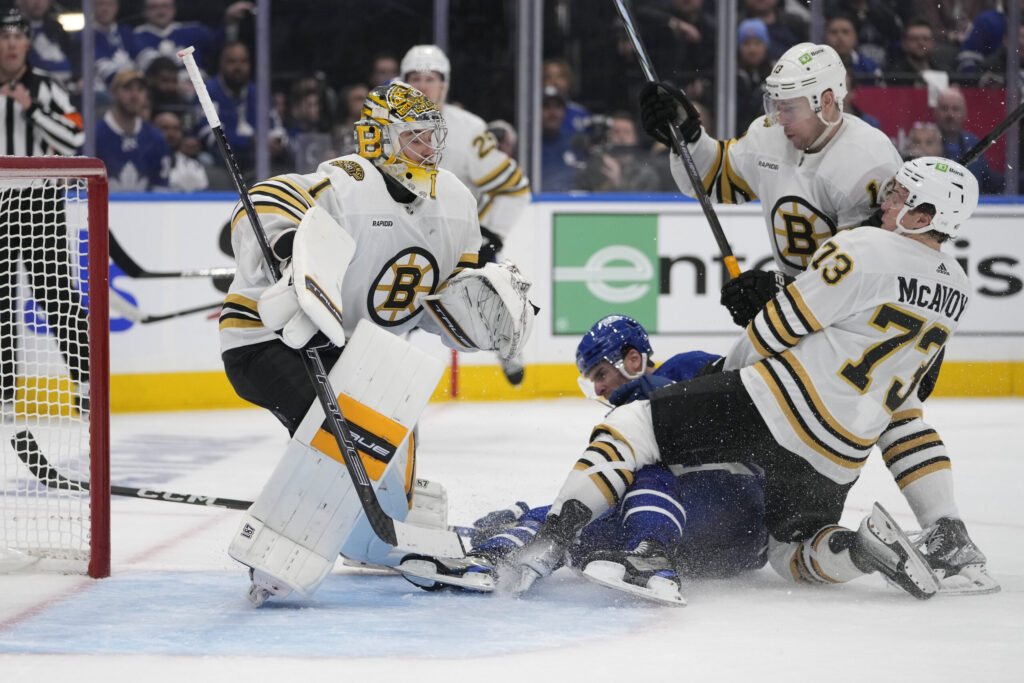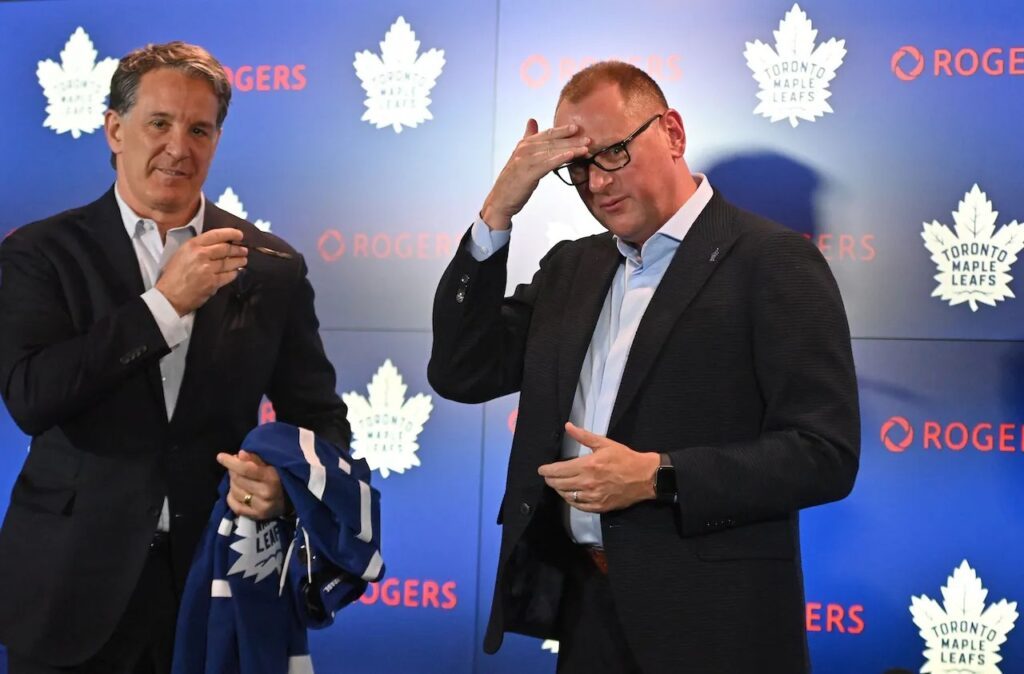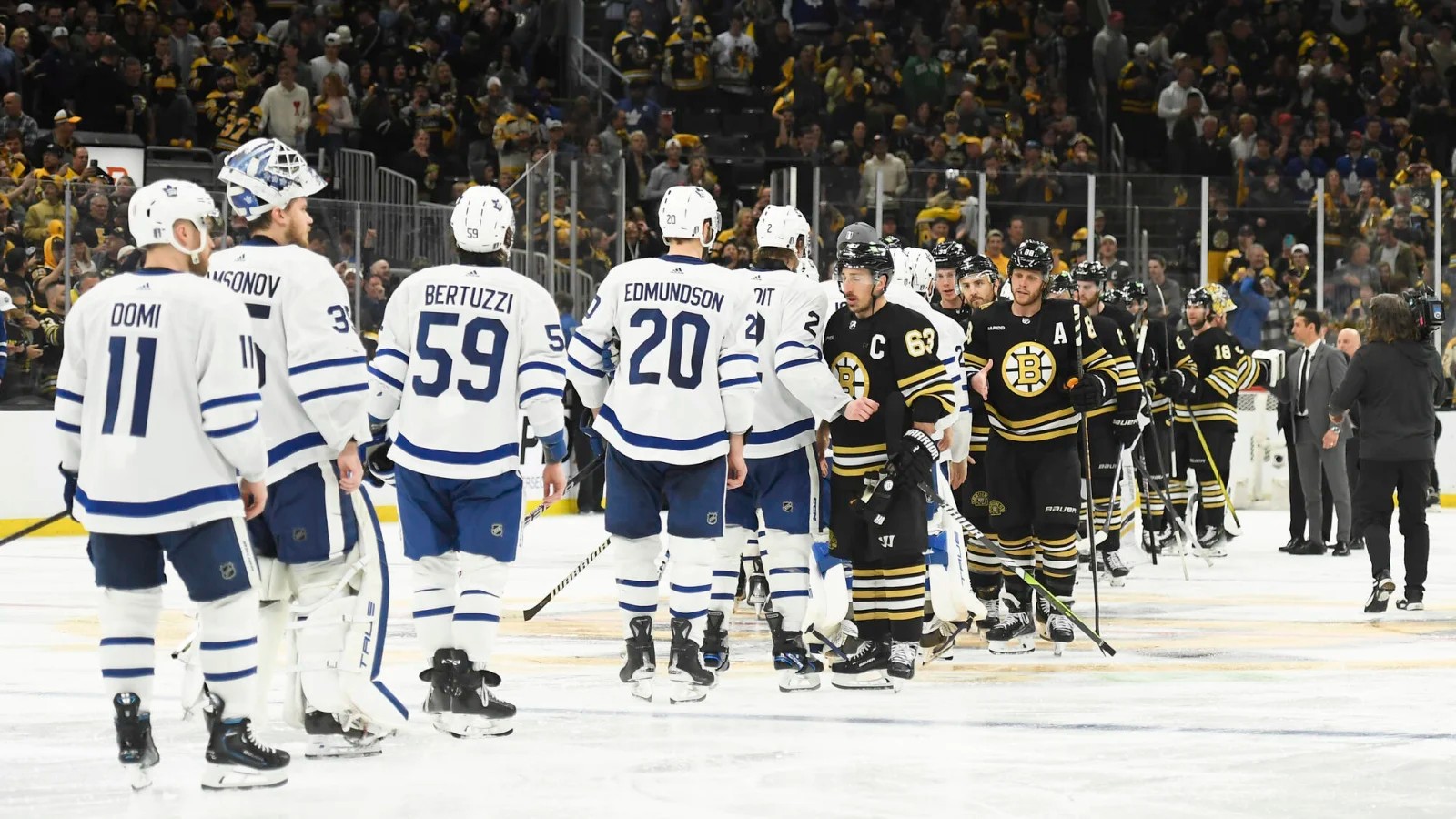In some ways, the latest Maple Leafs vs. Bruins post-season battle was one of the toughest playoff series to analyze.
Before the first game started, it was shockingly revealed that the Maple Leafs would be without one of their star forwards (the one with the most consistent history of playoff production) for Game 1. And then Game 2. And then Game 3. By the time they got him back in the lineup, their best player and one of the very best in the entire league mysteriously vanished due to illness, which turned into injury. Then he missed Game 5 and Game 6. Just as it’s announced that said player is returning for Game 7, the goalie who heroically led the team to back-to-back victories was shockingly ruled out for the deciding game. A bizarre bit of injury-related bad luck after injury-related bad luck.
Considering all that mess, plus the existing question of the high-ankle sprain to Mitch Marner, one could concoct a narrative that this is an impossible series to judge fairly. On the other hand, this is one of the easiest playoff series to judge because it’s the exact same playoff series that has played out so many times in recent years. Familiar narratives, flaws, and stories, on repeat. Same as it always was.
Why the Leafs lost to Boston

The Leafs lost to the Boston Bruins in seven games for several reasons, but the most obvious is that they could not score. Again. Despite a sensible pivot towards a more offensively-focused team in the offseason, the Leafs‘ offensive output did not change from previous playoff failures. Their goal totals over seven games: 1, 3, 2, 1, 2, 2, 1. The Leafs scored the second-most goals in the regular season and then failed to muster even two goals per game in the playoffs. It’s now 14 straight playoff games that the Leafs have scored three goals or fewer, dating back to last season, with only Game 2 of this series featuring three Toronto tallies. In the other 13 games, they scored one or two goals.
It goes without saying that if your team can only score a maximum of two goals in a playoff game, you will not have much success. The offensive culprits are varied, but the blame primarily falls on the star players. The Maple Leafs are built on the premise that their star forwards are so good that they will outscore the opposition, and like so many times previously, that didn’t really happen. Auston Matthews was an effective offensive presence to the extent he could be, given the sickness and injury. William Nylander took a couple of games to get going after returning from injury but did score three goals in the last two games (all three of the team’s goals). I don’t fault him too much, either.
Rather, the biggest problems were Marner, John Tavares, and Morgan Rielly. Marner played in all seven games and produced just three points, only one of which was a goal. Maybe he was still hampered by the after-effects of the high-ankle sprain, but Marner’s playoff effort feels all too similar to many past playoff performances for the logic to check out for most fans. Tavares, who is only loosely a star at this point, scored only two points the entire series. Expectations are lower for a now-33-year-old in the declining part of his career (one who played a lot of matchup minutes this series, to boot), but the salary remains the same, and getting two points out of 13.2% of the cap presents a major roster problem.
Then there’s Rielly, whose history of great playoff performances didn’t materialize in this series. He recorded three points, all assists, and two were superfluous secondary assists. The Leafs’ offense was weighed down by their lack of offensive contributions from the defense, and Rielly faces the most scrutiny in that regard as the only defender expected to produce offense.
This leads to the other problem: a defense built with not enough offensive juice in the first place. The defenseman who put himself in the best places offensively was Joel Edmundson, which is problematic because Edmundson lacks any semblance of offensive skill with the puck on his stick. The rest of the group didn’t offer much, with Jake McCabe’s Game 5 screened point shot goal standing up as the lone exception.
Of course, the depth didn’t provide enough, either. Max Domi and Tyler Bertuzzi both notched four points, tied for the team lead, but only two goals between them. The bottom six was almost entirely without offensive contributions—another long-running problem for this team. The Leafs entered the playoffs believing they were deeper and more offensively potent than in years past, but it was ultimately nowhere to be seen.
The Leafs failed to get to the middle of the ice consistently. Rush chances were pretty limited, and as was the case in the regular-season matchups in Boston, they could not break down the Bruins’ in-zone defensive structure. The series was some degree of a microcosm of all the previous playoff defeats the Maple Leafs have suffered, the same combination of a team with good defensive structure and a quality goalie muzzling Toronto’s supposedly vaunted offense. Game 7 was more of the same, the fourth straight winner-take-all game defeat in which the Leafs scored either zero or one goal. When it’s all on the line, and the opponent is at its most disciplined defensively, the Leafs still have no answer for how to break it down.
Where do the Leafs go from here?

The Toronto Maple Leafs find themselves in a precarious position as the offseason begins. They have a roster with some quality talent but also considerable flaws and limited latitude to fix them. The questions will start at the top, where new Maple Leaf Sports & Entertainment CEO Keith Pelley has to decide on Brendan Shanahan’s future. If the belief is that something serious needs to change with this team, then relieving Shanahan of his duties is the only conclusion that makes any sense.
Over the past year, it has been laid out in plain English that the decision to ruthlessly defend the status quo and oppose any idea of making large-scale changes to the roster starts with Shanahan. Shanahan jumped into action as quickly as possible to notify the Core Four that none would be traded after Kyle Dubas was let go, pretty much dictating policy to the new GM he hadn’t even hired yet. Shanahan then oversaw the decision to extend Sheldon Keefe. The one constant in this Maple Leafs team over the past decade is Shanahan, who has shuffled several GMs and head coaches, while the team’s undying fealty to the notion that the star forwards will deliver in the playoffs stays the same. At this point, one must conclude that the belief in those players was not only Kyle Dubas’ but also Brendan Shanahan’s. Shanahan believed Marner, Matthews, Nylander, and Tavares would eventually have a terrific playoff and deliver a deep playoff run in Toronto. Eight years of playoff appearances later, that never happened. Not even close.
Firing Sheldon Keefe would be the next logical step. While he does have a contract extension yet to kick in (one he should never have received in the first place), it is nearly impossible to justify bringing him back. Has any coach in NHL history gotten this many cracks at the playoffs with so little success relative to his regular-season performances? Keefe has now gotten to coach in five playoffs and is 1-6 in the playoff series he’s coached in, winning a grand total of one game beyond the first round. Bruce Boudreau got four playoffs in Washington and four playoffs in Anaheim before his team’s early exits in each brought the axe down upon his neck. And in defense of Boudreau, he at least took Washington to the second round twice and Anaheim to the Conference Finals once, achievements Keefe hasn’t even come close to matching.
That Keefe is the NHL’s fifth-longest tenured head coach, behind only three coaches who have won the Stanley Cup with their current team (Cooper, Sullivan, Bednar) and Rod Brind’Amour, who has won a playoff series in five of his six playoff appearances (made two Conference Finals), is preposterous. It also speaks to the lack of urgency this franchise has displayed under Brendan Shanahan’s leadership. It is not important that the team actually wins in the playoffs; rather, close to winning is good enough (or, you know, “respect in (that) handshake line”). It’s hard not to wonder what could’ve become of the Leafs if they had moved on from Keefe after that embarrassing comment following the 2022 playoffs when Keefe was outcoached for a third straight playoff and the team again failed to win a playoff round. Bruce Cassidy, who won a Stanley Cup last season, was available, as was Pete DeBoer, who has taken four different franchises to the Conference Finals.
In some ways, the decision to continually retain Keefe is the perfect example of the Shanaplan’s greatest undoing to this point: its obsessive defense of process over results. You can absolutely go wrong running an NHL team by making rash decisions and rushing into panic trades. One would argue that the Leafs did that when they sold Nazem Kadri for pennies on the dollar in the summer of 2019. It is absolutely a valid concern, but Shanahan’s front office has gone too far in the other direction, almost to a maniacal extent. It is one thing to slow down the thought process and not want to rush into potentially earth-rattling changes. It is another to blindly defend the increasingly indefensible year after year.
One individual playoff series can be highly random (see the Colorado Avalanche’s defeat in last year’s first round to an iffy Seattle Kraken team), and a single seven-game playoff series is too small of a sample size to draw grand conclusions from. Shanahan was correct in not overreacting to one while deferring to regular season results in the aggregate. Regular season results have consistently shown this to be a good Maple Leafs team. However, the playoff results have consistently shown that this is not a great Maple Leafs team capable of knocking off the good teams who occupy their division. And the sample size, over the past couple of playoffs, has gotten to the point that it is no longer so small that conclusions can’t be drawn from it. They are 1-6 against Boston, Tampa, Florida, and Montreal in the playoffs over the life of the Matthews/Marner core.
Something is seriously wrong with this team, and whoever is sitting atop the organization at the NHL Draft needs to decide how to fix what ails the Maple Leafs. The biggest decision will be made on Mitch Marner since the team is already locked into Auston Matthews and William Nylander. We’re amid another heated discussion of Marner’s culpability after a disappointing playoff, but I don’t know how much there is to debate. Marner has, over the past couple of playoffs, shown himself to be a solid performer in the playoffs, but not one befitting of his salary. The debate often gets blown out of proportion as the argument is misunderstood. Marner is not a *bad* playoff player. He generally puts up decent point totals and wins his minutes from a territorial sense, not getting caved in or scored on often.
The truth, though, is Marner *is* a disappointing playoff player. Since his very strong 2018 playoffs, Marner has scored an 8-29-37 line in 44 playoff games. Again, putting up those stats while playing good defense in hard minutes is neat! Nothing wrong with it in the abstract. But it is not $10.9 M worth of playoff production and not good enough to be the second-best player on a championship team — especially when Marner’s playoff production is often heavily concentrated in the earlier games in a series. Starting with the 2019 series against Boston, Marner has just five assists (no goals) from Games 5-7 of a series in 16 games. When the series is at its tightest, the most on the line, and the space hardest to come by, Marner is nowhere to be found.
It’s not good enough when you compare that to other teams that have won it all. Nikita Kucherov scored 93 points in 71 playoff games over Tampa’s three runs to the Stanley Cup Final. Brayden Point scored 56 points in 46 games, with 28 goals, over the two years that Tampa won the title. Nathan MacKinnon and Mikko Rantanen each scored well over a point-per-game when the Avalanche won the Stanley Cup in 2022. So did Jack Eichel, Jonathan Marchessault, and Mark Stone last season for Vegas. There is a level of play that is necessary from your best two or three players to win the Stanley Cup or even to make a deep run, and Marner consistently does not reach that level in the playoffs, borne out over and over across many playoffs.
Marner’s cap hit is the ninth-highest in the NHL. Over parts of this contract, it ranked even higher. The contract expires next summer, and negotiations can begin this summer. If Marner’s camp demands a raise on the current cap number, which feels likely given his regular season production and the rising salary cap, I don’t know how you can justify it from the Leafs’ perspective — especially on a Leafs team with two other high-salary forwards that needs to maximize its cap allocation and can’t afford wasted dollars. The debate over Marner isn’t so much, “You have to trade someone for the sake of trading someone,” but a legitimate discussion over whether the cap number Marner will demand on his next contract is worth it. At this point in time, with Marner’s production (or lack thereof) when the season is on the line against the top playoff opponents, I would argue no.
Clearly, a trade should be discussed if the Leafs decide they do not plan to extend Marner. Marner has a no-movement clause, which, in theory, complicates the picture, but even if he didn’t, the Leafs would be able to extract more value by trading Marner to a team that wanted to extend him anyway. If the Leafs do not plan to extend Marner, the forward is incentivized to facilitate a trade because of the possible eighth year of a contract he couldn’t secure signing with an external team in unrestricted free agency. No movement clauses are not the end-all-be-all, and players are unlikely to dig in and refuse to waive if they are no longer wanted or no longer part of a team’s future. Those are the tough conversations that will need to be had this offseason.
It’s considerably less likely that the Leafs could move John Tavares. His no-movement clause is a different beast, given his age and place in life, and a buyout makes no sense at this point. The more likely outcome is to eat the final year of this contract and perhaps change the dynamics by stripping him of the captaincy (something the San Jose Sharks often tried under Doug Wilson after playoff defeats). Perhaps Morgan Rielly is someone the Leafs could look to ship out, but six more years at $7.5 M will not be easy to move, and like Tavares, you have an NMC to navigate (one that is also much harder than Marner’s to work around).
In short, the Leafs have a big problem with a core that needs changing but limited ability to change it because so many of the pieces are already signed to massive deals and have trade protection. Marner is the easiest one to move and, I would argue, also the one most deserving of leaving. What Toronto could get in exchange is a much tougher question. Maybe it’s a hockey trade for two lesser pieces, and you hope 4 = 2+2, or maybe it’s futures, which are then used to acquire other players. Waiting to trade Marner until now, as opposed to the summer of 2022 before the NMC kicked in and when he was coming off a decent playoff effort, seems like a mistake in hindsight.
The other high priority for the Maple Leafs in the offseason is to fix the blue line, and this is where things look grim. Morgan Rielly, so often a playoff hero, flopped in these playoffs. Hopefully, it was a one-off, but the series was a frightening glimmer into what the Leafs could look like if Rielly begins to decline — something, we should note, that isn’t inconceivable given that Rielly is now 30 years old. With that contract attached, the Leafs could be in a world of pain if Rielly’s play trends downward.
For now, we should assume that Rielly is alright. Jake McCabe is a steady piece for next season, but there are long-term questions for him, too. He’s also 30 and has only one year remaining on his contract. After those two, it’s completely an open question. Simon Benoit will factor in somewhere as a younger player on a cheaper contract signed for the next three seasons. He’s a nice piece who will be one of the six, but the Leafs need to add more impactful defenders. Assuming Conor Timmins is merely depth, they have three spots out of the six to fill.
Timothy Liljegren is a restricted free agent, but it’s worth wondering about his future at this time. Brad Treliving did not acquire Liljegren, and he doesn’t perfectly fit what Treliving prefers from a size or physicality standpoint. The Leafs routinely scratched Liljegren in past playoffs before finally playing him in all but one game this season, a series that saw Liljegren struggle significantly. He’s a right-shot defender, which may keep him around, but it’s worth pondering at this point if Liljegren will ever be a good enough defenseman to be a reliable playoff performer.
And after that, it’s pretty wide open. Years of hemorrhaging draft assets at the trade deadline to chase veteran defensemen (Jake Muzzin, Mark Giordano), not to mention rental forwards who played nary more than a couple weeks of games before walking for nothing in UFA, have sapped the Maple Leafs of any sort of youth movement on defense. Topi Niemela exists in the AHL, but no one seems to believe he’s a serious solution for the immediate future. The farm system is barren at this position, and unfortunately, quality defensemen are difficult to acquire. And to make matters worse, the Leafs are also gutted on draft picks in future drafts, owning just three picks in the first three rounds over the next three drafts. They have more cap flexibility in the future than they’ve had in the past, but only so many good defensemen appear on the free-agent market.
Goaltending is also up in the air. Joseph Woll is a good and cheap NHL goalie who will likely be on the team, but it feels impossible to count on him, given his health situation. There were two separate moments this season when it appeared that Woll was stealing the crease for good (once in the regular season and once in the playoffs), and both times, he immediately got injured. Health issues have plagued him his entire career, dating back to the minor leagues, and until he shakes the injury-prone label, I’m not sure how the team can count on him. The Leafs must pair Woll with a goalie who can take the load when Woll inevitably falls injured. Again, this situation is murky. Does the team believe in Ilya Samsonov enough to bring him back? The UFA market almost entirely consists of backups (do you really want to sign Cam Talbot?), and it does not seem like Dennis Hildeby in the AHL is 100% ready. Perhaps the Leafs try to center a Marner return around a goalie?
This is a massive, franchise-altering summer upcoming. The Leafs have some really nice things going for them: star players still signed long-term (Matthews/Nylander) and a nice supporting cast featuring Matthew Knies, Bobby McMann, Simon Benoit, Jake McCabe, etc. But they weren’t close to true Cup contention this season, and figuring out how they can reach the ultimate goal won’t be easy. They must navigate trade protection if they want to trade out a star. They need to rebuild an aging and subpar blue line with only so much cap space and very limited trade assets. And they need to solve the goaltending situation amid a dreadful UFA goalie market.
Brad Treliving (assuming he is still the GM) will need to be bold and creative to rework a Leafs team that is no longer young. The clock is ticking on this core, and his predecessor’s pursuit of the Cup has limited the ammo Treliving has to throw around. The best hope is to pull off a Marner trade that spreads talent around a little better, acquire one substantial piece on D, and hire a new coach, hoping that coach installs a better offensive approach in the playoffs.
Another loss to Boston, just like five years ago, reveals the reality of the situation in such a painful fashion. A half-decade has passed, the core is so much older, and yet they have achieved so little, all the while shoveling assets into the fireplace to fuel the failed playoff runs of the past. The Leafs are no closer to winning it all now than they were five years ago, and one could argue that they are actually further away. The number of kicks at the can they have remaining is shrinking. The era of patience has to be over. It didn’t fit the team a few years back and certainly doesn’t now. Now, we’ll find out if MLSE finally understands it.

































